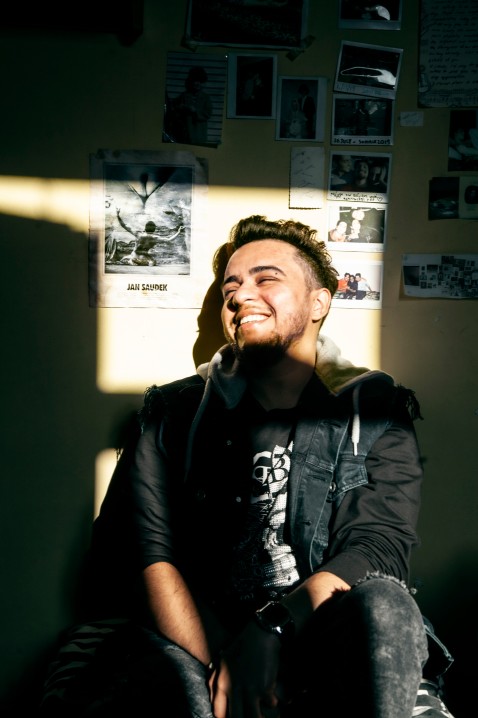Jack / Lebanon, Omar Gabriel
“Jack is a 32-year-old Iraqi trans man. A few months back he decided to leave Iraq and move to Lebanon to do his top surgery and spare himself and his family the social quarrels with the conservative tribal entourage, he wouldn’t find the tolerance and acceptance that would let him live comfortably with his body. He reminisces about his childhood, he remembers how he used to look different from his siblings, he always had facial hair despite the feminizing hormones prescribed by the doctor, whom he was forced to visit by his father, without considering Jack’s preference.
While in Iraq, he was introduced to the queer community through social media, he maintained virtual friendships with people from Lebanon, Syria, Egypt, Morocco, Algeria and other places from the world, he couldn’t recognize members of the community where he lived due to social difficulties. He remembers one guy who was beaten to death by a bunch of fanatics who considered him “pervert” for having long hair. Jack says that the phenomenon of physical attacks on people with tattoos and long hair for being considered as “perverts” is quiet spread.
This year, Jack came to Wadi Khaled with his Syrian friend, he visited a private surgeon’s clinic to perform a partial mastectomy. He recalled some of his conversations with the doctor, such as his advice to him to perform an operation to remove the remaining fat around the nipple or to go to the gym for this matter. Jack crossed the military checkpoint into northern Lebanon as a female. A week following the operation, and after having rested in the house of an acquaintance, he returned with a paper from the doctor to present it at the checkpoint, but he encountered a hostile officer who bombarded him with a barrage of questions before arresting him. In the room, the officer yelled at him: “This is a girl’s ID!”, “Yes”, Jack replied. The officer added: “But you are a young man!”,
Jack remained silent. He was taken to a second room, where five officers severely beat him. They tried to take off his clothes and strip him naked, but he refused. After the torture, he explained his situation to them, revealing that he was a trans man. They confiscated and searched his phone and forced him to sign a statement without knowing its contents. In prison, he met Syrian detainees who were unable to cross the checkpoint because they only possessed copies of their original identity papers. He recalls the mockery and hurtful bullying he was subjected to by an officer, as the latter told everyone the story of Jack’s transness, in an attempt to destroy him emotionally.
He was taken with the rest of the detainees in security cars to the Lebanese-Syrian border, the soldiers fired in the air to intimidate them and forced them to climb the mountain with loads on their backs. He moved for a while to Homs, and came back to Lebanon after securing his way. He yearns for the love of a Syrian woman with whom he fell in love, and who supported him in his ordeal, wiping with the warmth of her palms the wounds of his chest. They were separated by borders, official papers, and the fear of the security services. Jack lives on the outskirts of the Lebanese capital, unemployed despite his decade-long experience working in a laboratory, due to his identity papers issue.
It is difficult for Jack to recall warm memories of his childhood, which were overshadowed by images of cruelty and violence. He longs for his mother, remembering her favor to him and his siblings when she sold her gold jewelry to afford food for the family. He bought his mother a ring and a bracelet, then a necklace, with the first monthly salary he ever received. He appreciates her attempt to understand and accept him. He laughs when he remembers her reaction and her shock when seeing his face via video call in their first conversation. She told him: “It is impossible, not you!” He answered her: “Yes, I changed…”, she replied to him: “Whatever makes you comfortable my son…” Sometimes, the mother mistakes the pronouns and misgenders him, but always manages to correct herself.
Jack has always listened to an inner voice urging him to resist and persevere, which sounds clear when he talks about violence against women and the disparity of power dynamics in light of patriarchy. This inner voice reminds him that it is impossible for the situation to last as it is, and that he will rise after every disappointment. Jack prefers sad music, despite his openness to its different colors, especially the one that makes him contemplate and reflect on his experiences. As for sports, he loves football from a young age, and supports the Brazilian and Argentinian national teams in the World Cup.”




